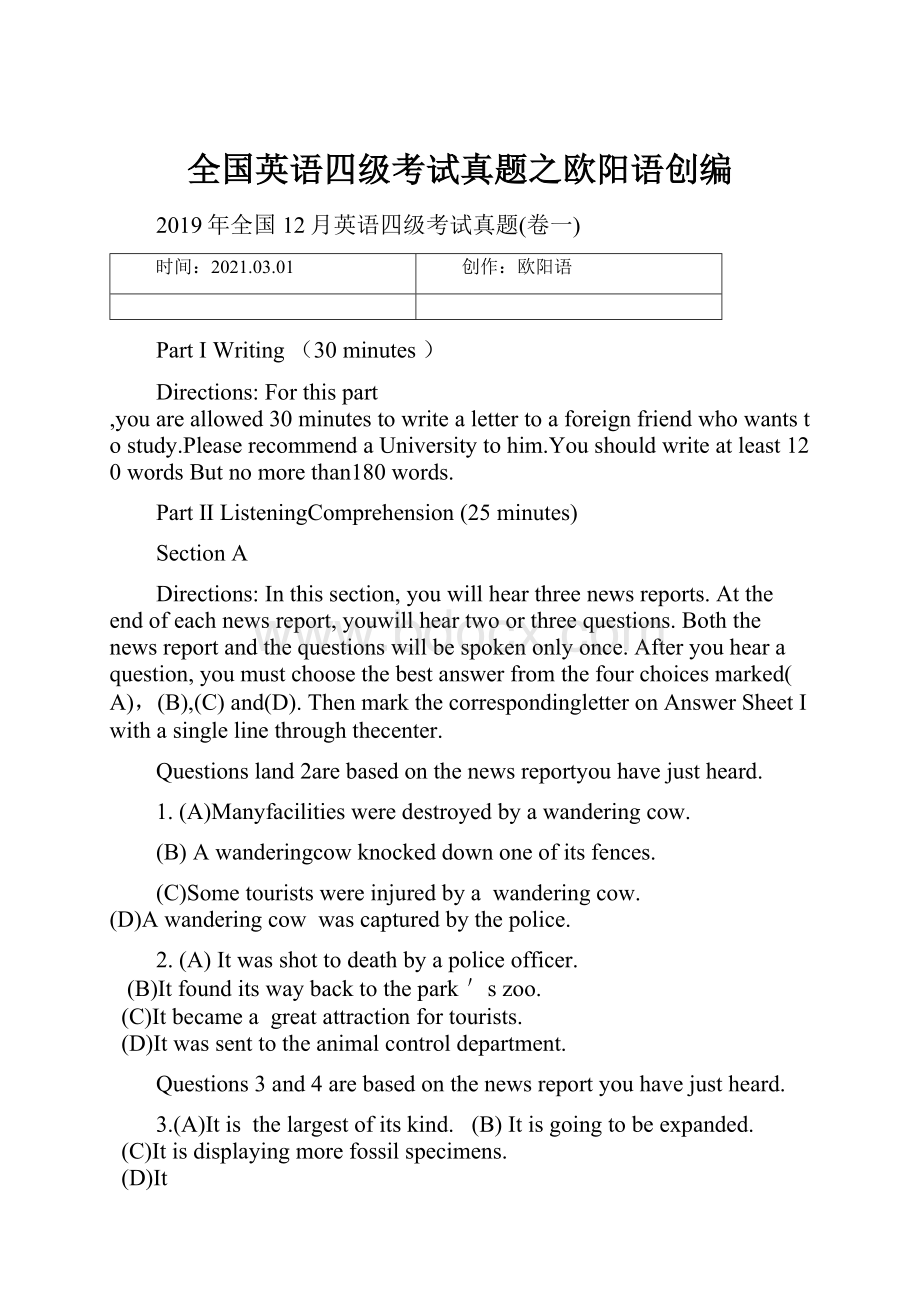全国英语四级考试真题之欧阳语创编.docx
《全国英语四级考试真题之欧阳语创编.docx》由会员分享,可在线阅读,更多相关《全国英语四级考试真题之欧阳语创编.docx(14页珍藏版)》请在冰豆网上搜索。

全国英语四级考试真题之欧阳语创编
2019年全国12月英语四级考试真题(卷一)
时间:
2021.03.01
创作:
欧阳语
PartⅠWriting(30minutes)
Directions:
For this part,you are allowed 30 minutes to write a letter to a foreign friend who wants to study.Please recommend a University to him.You should write at least 120 words But no more than180 words.
PartⅡListeningComprehension(25minutes)
SectionA
Directions:
Inthissection,youwillhearthreenewsreports.Attheendofeachnewsreport,youwillheartwoorthreequestions.Boththenewsreportandthequestionswillbespokenonlyonce.Afteryouhearaquestion,youmustchoosethebestanswerfromthefourchoicesmarked(A),(B),(C)and(D).ThenmarkthecorrespondingletteronAnswerSheetIwithasinglelinethroughthecenter.
Questionsland2arebasedonthenewsreportyouhavejustheard.
1.(A)Manyfacilities were destroyed by a wandering cow.
(B)A wanderingcow knocked down one of its fences.
(C)Some tourists were injuredby a wandering cow.
(D)A wandering cow was captured by the police.
2.(A) It was shot to death by a police officer.
(B)It found its way back to the park 'szoo.
(C)It became a great attraction for tourists.
(D)It was sent to the animal control department.
Questions 3 and 4 are based on the news report you have just heard.
3.(A)Itis the largest of its kind. (B) Itis going to be expanded.
(C)Itis displaying more fossil specimens.
(D)Itis staring an online exhibition.4.(A) A collection of bird fossils from Australia.
(B)Photographs of certain rare fossil exhibits.
(C)Some ancient wall paintings from Australia.
(D)Pictures by winners of a wildlife photo contest.
Questions 5 to 70are based on the news report you have just heard.
5.(A) Pick up trash.
(B)Amuse visitors.
(C)Deliver messages.
(D)Play with children.
6.(A)They are especially intelligent.(B)They are children's favorite.
(C)Theyarequiteeasytotame.
(D)Theyarecleanandpretty.
SectionB
Directions:
Inthissection,youwillheartwolongconversations.Attheendofeachconversation,youwillhearfourquestions.Boththeconversationandquestionswillbespokenonlyonce.Afteryouhearaquestion,youmustchoosethebestanswerfromthefourchoicesmarkedA,B,CandD.ThenmarkthecorrespondingletteronAnswerSheet1withasinglelinethroughthecenter.
Questions 8 to 11are based on the conversationyou have just heard.
8.(A)ItwillbeproducedatHarvardUniversity.
(B)Itwillbehostedbyfamousprofessors.
(C)Itwillcoverdifferentareasofscience.
(D)Itwillfocusonrecentscientificdiscoveries.
9.(A)Itwillbemorefantastic.
(B)Itwillbemoresystematic.
(C)Itwillbemoreentertaining.
(D)Itwillbeeasiertounderstand.
10.(A)Peopleinterestedinscience.
(B)Youngsterseagertoexplore。
(C)Childrenintheirearlyteens。
(D)Studentsmajoringinscience。
11.(A)Offerprofessionaladvice。
(B)Providefinancialsupport。
(C)Helppromoteitontheinternet
(D)Makeepisodesforitsfirstseason。
Questions 12 to 15are based on the conversationyou have just heard.
12.(A)Unsure。
(B)Helpless。
(C)Concerned。
(D)Dissatisfied。
13.(A)Heistooconcernedwithbeingperfect
(B)Helosesheartwhenfacedwithsetbacks。
(C)Heistooambitiousinachievinggoals。
(D)Hetakesonprojectsbeyondhisability.
14.(A)Embarrassed。
(B)Unconcerned。
(C)Miserable。
(D)Resentful。
15.(A)TrytobeoOptimisticwhateverhappens.
(B)cComparehispresentwithhispastonly。
(C)Alwayslearnfromothersachievements。
(D)Treatothersthewayhewouldbetreated。
SectionC
Directions:
Inthissection,youwillhearthreepassages。
Aftertheendofeachpassage,youwillhearthreeorfourquestions。
Boththepassageandthequestionswillbespokenonlyonce。
Afteryouheardaquestion,youmustchoosethebestanswerfromthefourchoicesmarkedA,B,CandD.ThenmarkthecorrespondingletteronAnswerSheet1withasinglelinethroughthecenter。
Questions16to18areBasedonthepassageyouhavejustheard。
16.(A)Theyhaveastrongersenseofsocialresponsibility。
(B)Theyaremorelikelytosucceedinthehumanities。
(C)Theyaremorelikelytobecomeengineers。
(D)Theyhavegreaterpotentialtobeleaders。
17.(A)Praisegirlswholiketospeakfrequently。
(B)Encouragegirlstosolveproblemsontheirown。
(C)Insistthatboysandgirlsworkedtogethermore。
(D)Respondmorepositivelytoboyscomments。
18.(A)Offerpersonalizedteachingmaterials。
(B)Provideavarietyofoptionalcourses。
(C)Placegreatemphasisontestscores。
(D)Payextraattentiontotopstudents。
Questions19to21areBasedonthepassageyouhavejustheard。
19.(A)Itoftenrainscatsanddogs。
(B)Itseldomrainsinsummertime。
(C)Itdoesn'trainasmuchaspeoplethink。
(D)It'soneofthemostrainycitiesintheU.S.。
20.(A)Theydrivemostofthetime。
(B)Therainisusuallyverylight。
(C)Theyhavegotusedtotherain。
(D)Theraincomesmostlyatnight。
21.(A)Ithasalotofplacesforentertainment。
(B)Ithasneverseenthunderandlighting。
(C)Ithasfavoritecloudydaysthananyothercoastalcity。
(D)Ithasmildweatherbothinsummerandinwinter。
Questions22to25areBasedonthepassageyouhavejustheard。
22.(A)Itoccurswhenpeoplearedoingarepetitiveactivity。
(B)Itresultsfromexertingone'smusclescontinuously。
(C)Ithappenswhenpeopleengageinanuncommonactivity。
(D)Itcomesfromstainingone'smusclesinanunusualway。
23.(A)Bloodflowandbodyheatincreaseintheaffectedarea。
。
(B)Bodymovementsintheaffectedareabecomedifficult。
(C)Theybegantomakerepairsimmediately。
(D)Theygraduallybecomefragmented。
24.(A)Aboutoneweek。
(B)Abouttwodays。
(C)Abouttendays。
(D)Aboutfourweeks。
25.(A)Applyingmusclecreams.
(B)Drinkplentyofwater。
(C)Haveahotshower
(D)Takepain-killers。
PartⅢReadingComprehension(40minutes)
SectionA
Directions:
Inthissection,thereisapassagewithtenblanks.Youarerequiredtoselectonewordforeachbankfromalistofchoicesgiveninawordbankfollowingthepassages.Readthepassagethroughcarefullybeforemakingyourchoices.Eachchoiceintheblankisidentifiedbyaletter.PleasemarkthecorrespondingletterforeachitemonAnswerSheet2withasinglelinethroughthecentre.Youmaynotuseanyofthewordsinthebankmorethanonce.
Questions26to35arebasedonthefollowigpassages.
Finally,somegoodnewsaboutairplanetravel.Ifyouareonaplanewithasickpassengeryouareunlikelytogetsick.Thatisthe26ofanewstudythatlookedathowrespiratory(呼吸道)viruses_27_onairplanes。
ResearchersfoundthatonlypeoplewhowereSeatedinindividual-hadahighriskofcatchingtheillness。
Allotherpassengershadonlyavery28Chanceofgettingsick,accordingtothefindings.Mediareportshavenotnecessarilypresented。
29对informationabouttheriskofgettinginfectedonanairplaneinthepast。
theTherefore,there'snewfindingsshouldhelpairplanepassengerstofeelless30tocatchingrespiratoryinfectionswhiletravelingbyair。
Priortothenewstudy,litterwasknownabouttherisksofgetting31infectedbycommonrespiratoryviruses,suchasthefluorcommoncold,onanairplane,theresearcherssaid。
So,to32therisksofinfection,thestudyteamflewon10different33intheUS.34sideofapersoninfectedwithflu,aswellasthosesittingonerowinfrontorbehindthisindividual,hadabout80percentchanceofgettingsick.Butotherpassengerswere35safefrominfection。
Theyhadalessthan3percentchanceofcatchingtheflu。
A)accurate(B)conclusion(C)directly(D)either(E)evaluate
(F)explorations(G)flights(H)largely(I)nearby(J)respond
(K)slim(I)spread(M)summit(N)vividly(0)vulnerable
SectionB
Directions:
Inthissection,youaregoingtoreadapassagewithtenstatementsattachedtoit。
eaEachstatementcontainsinformationgiveninoneoftheparagraphs。
Identifytheparagraphfromwhichtheinformationisderived。
Youmaychooseaparagraphmorethanonce。
Eachparagraphismarkedwithaletter。
AnswerthequestionsbymarkingthecorrespondingletteronAnswerSheet2。
ASouthKoreancitydesignedforthefuturetakesonalifeofitsown
(A)Gettingaroundthecityisonething--andthenthere'sthematterofgettingfromonecitytoanother.Oneversionoftheperfectcityofthefuture:
aplacethatofferseasyaccesstoairtravel。
In2011,aUniversityofNorthCarolinabusinessprofessornamedJohnKassrdapublishedabookcalledAerotropolis:
TheWayWeWillLiveNext.Kasardasaysfuturecitiesshouldbebuiltintentionallyaroundornearairports.Theidea,ashehasputit,istoofferbusiness"rapid,long-distanceconnectivityonamassivescale."
(B)“The18thcenturyreallywasawaterbome(水运的)century,the19thcenturyarail
century.The20thcenturyahighway,car,truckcentury--andthe21stcenturywillincreasinglybeanaviationcentury,astheglobebecomesincreasinglyconnectedbyair,"Kasardasays.Songdo,acitybuiltfromscratchinSouthKorea,isoneofKasarda'sprimeexamples.Ithasexistedforjustafewyears.“Fromtheget-go,itwasdesignedonthebasisofconnectivityand
competitiveness"saysKasarda.“ThegovernmentbuiltthebridgedirectlyfromtheairporttotheSongdoInternationalBusinessDistrict.Andthesurfaceinfrastructurewasbuiltintandemwiththenewairprot"
(C)Songdoisastone'sthrowfromSouthKorea'sIncheonAirport,itsmaininternationalhub
(枢纽).Butittakesalotmorethananearbyairporttobeacityofthefuture.Justbuildingaplaceasan“internationalbusinessdistrict"doesn'tmeanitwillbecomeone.ParkYeonSooconceived(构想)thiscityofthefuturebackin1986.HeconsidersSongdohisbaby.Iama“visionary’,hesays.Thirtyyearsaft